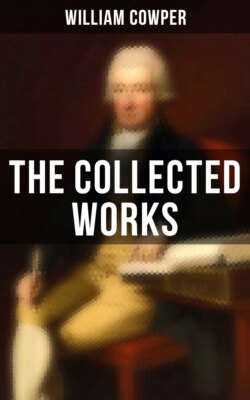Читать книгу The Collected Works - William Cowper - Страница 95
На сайте Литреса книга снята с продажи.
TO THE REV. WILLIAM UNWIN.
ОглавлениеTable of Contents
Olney, July 11, 1780.
I account myself sufficiently commended for my Latin exercise, by the number of translations it has undergone. That which you distinguished in the margin by the title of "better" was the production of a friend, and, except that, for a modest reason, he omitted the third couplet, I think it a good one. To finish the group, I have translated it myself; and, though I would not wish you to give it to the world, for more reasons than one, especially lest some French hero should call me to account for it, I add it on the other side. An author ought to be the best judge of his own meaning; and, whether I have succeeded or not, I cannot but wish, that where a translator is wanted, the writer was always to be his own.
False, cruel, disappointed, stung to the heart,
France quits the warrior's for the assassin's part;
To dirty hands a dirty bribe conveys,
Bids the low street and lofty palace blaze.
Her sons too weak to vanquish us alone,
She hires the worst and basest of our own.
Kneel, France! a suppliant conquers us with ease,
We always spare a coward on his knees.[62]
I have often wondered that Dryden's illustrious epigram on Milton,[63] (in my mind the second best that ever was made) has never been translated into Latin, for the admiration of the learned in other countries. I have at last presumed to venture upon the task myself. The great closeness of the original, which is equal, in that respect, to the most compact Latin I ever saw, made it extremely difficult.
Tres tria, sed longè distantia, sæcula vates
Ostentant tribus è gentibus eximios.
Græcia sublimem, cum majestate disertum
Roma tulit, felix Anglia utrique parem.
Partubus ex binis Natura exhausta, coacta est,
Tertius ut fieret, consociare duos.
I have not one bright thought upon the chancellor's recovery; nor can I strike off so much as one sparkling atom from that brilliant subject. It is not when I will, nor upon what I will, but as a thought happens to occur to me; and then I versify, whether I will or not. I never write but for my amusement; and what I write is sure to answer that end, if it answers no other. If, besides this purpose, the more desirable one of entertaining you be effected, I then receive double fruit of my labour, and consider this produce of it as a second crop, the more valuable because less expected. But when I have once remitted a composition to you, I have done with it. It is pretty certain that I shall never read it or think of it again. From that moment I have constituted you sole judge of its accomplishments, if it has any, and of its defects, which it is sure to have.
For this reason I decline answering the question with which you concluded your last, and cannot persuade myself to enter into a critical examen of the two pieces upon Lord Mansfield's loss,[64] either with respect to their intrinsic or comparative merit, and, indeed, after having rather discouraged that use of them which you had designed, there is no occasion for it.
W. C.
